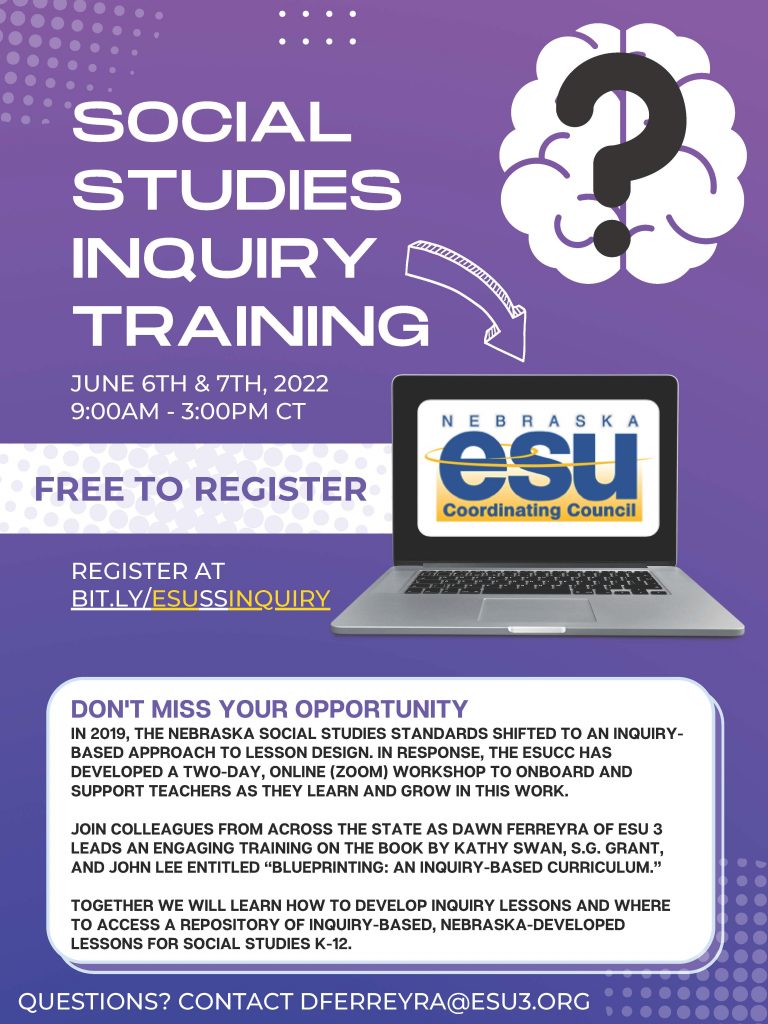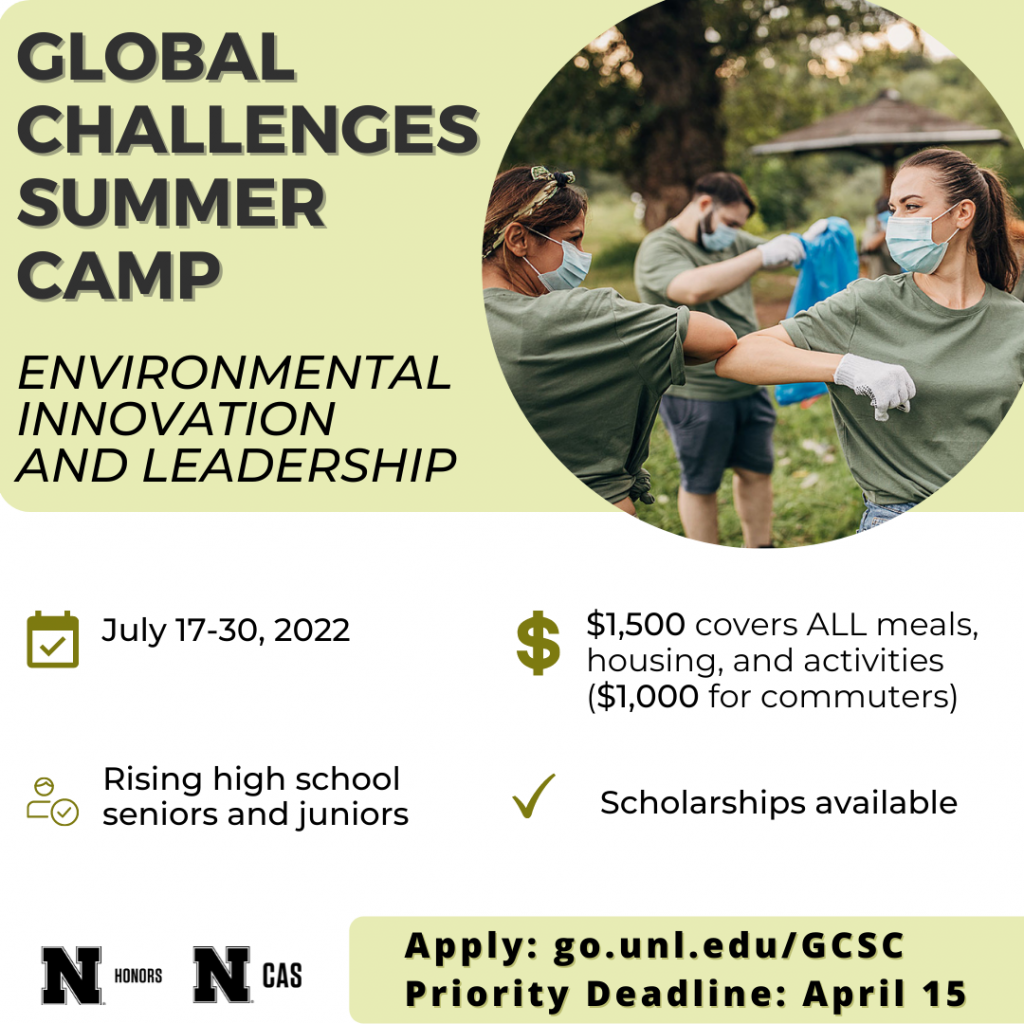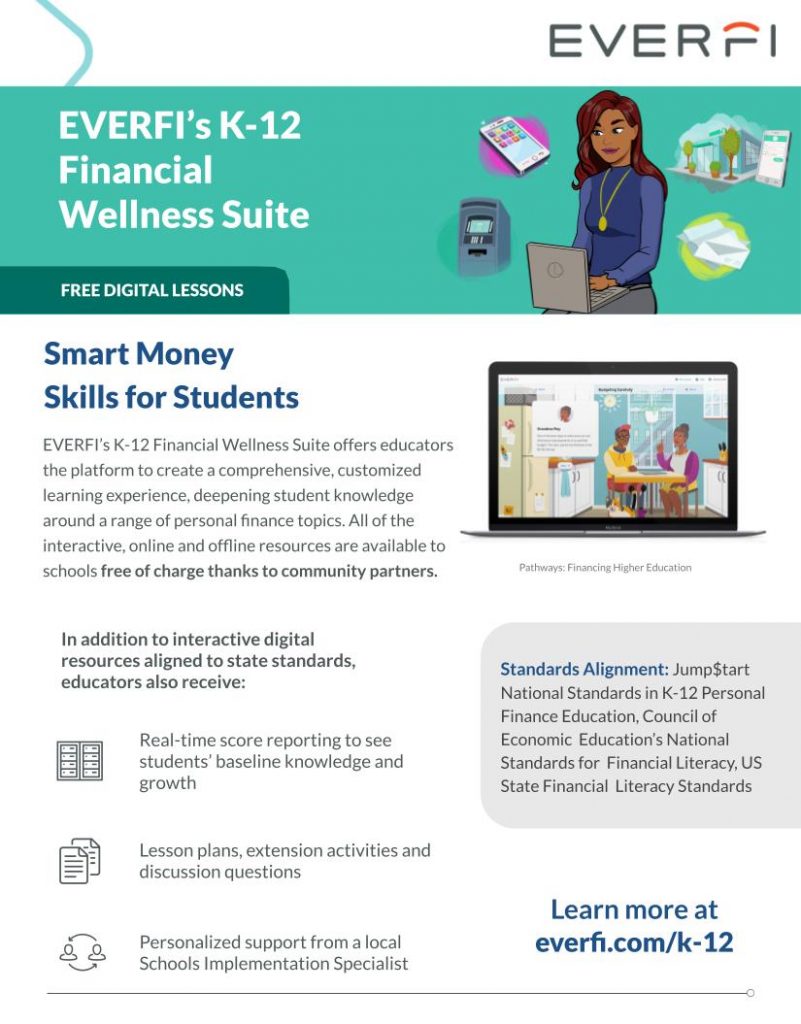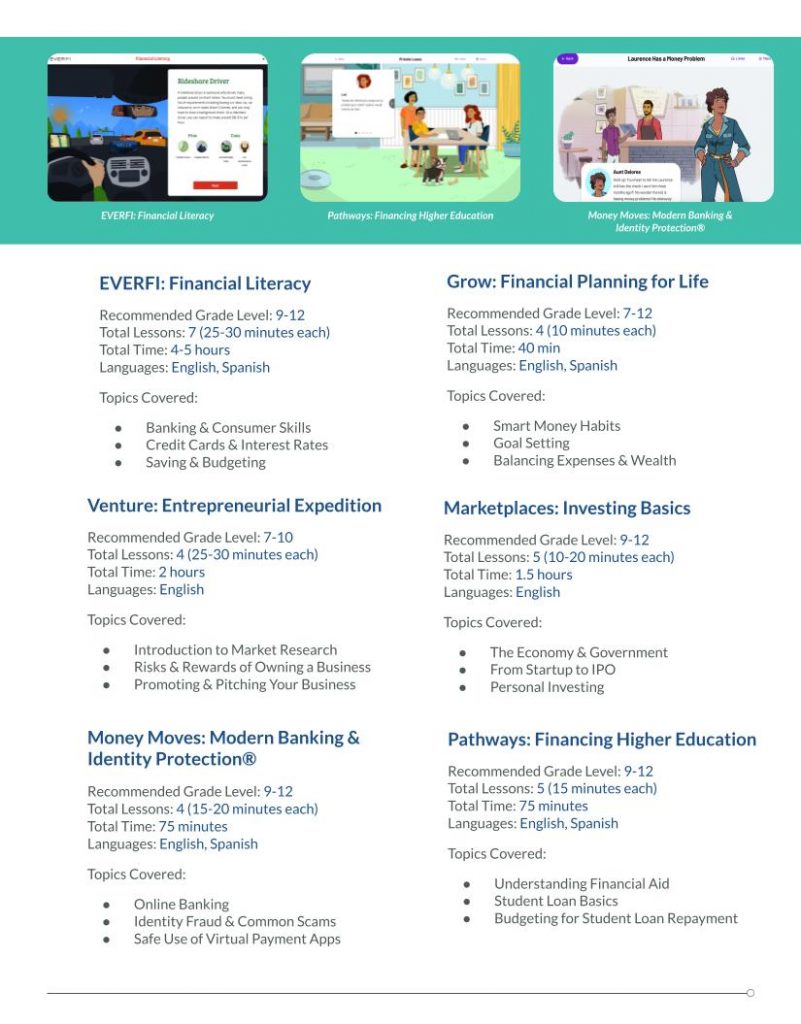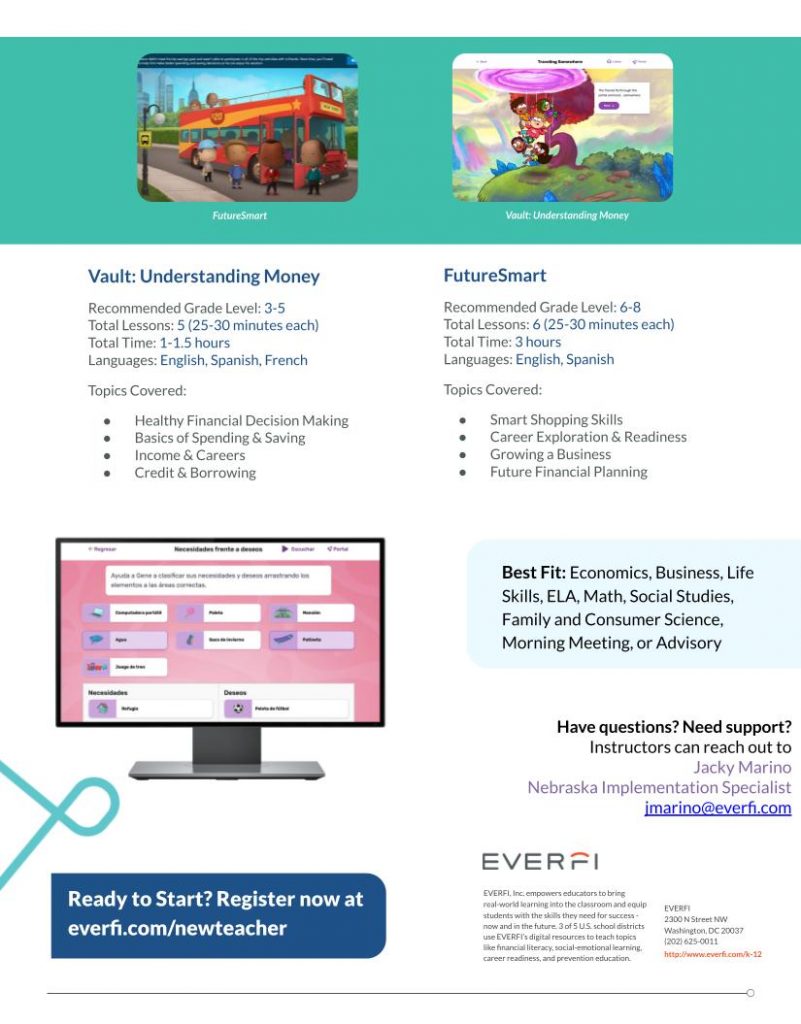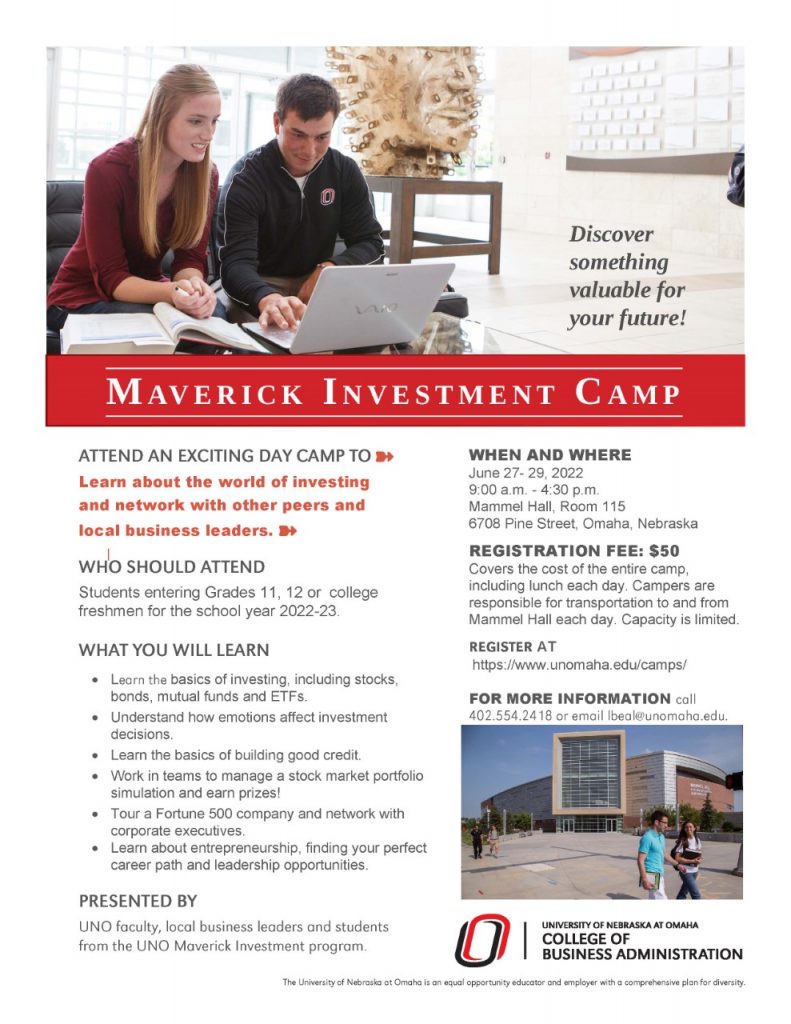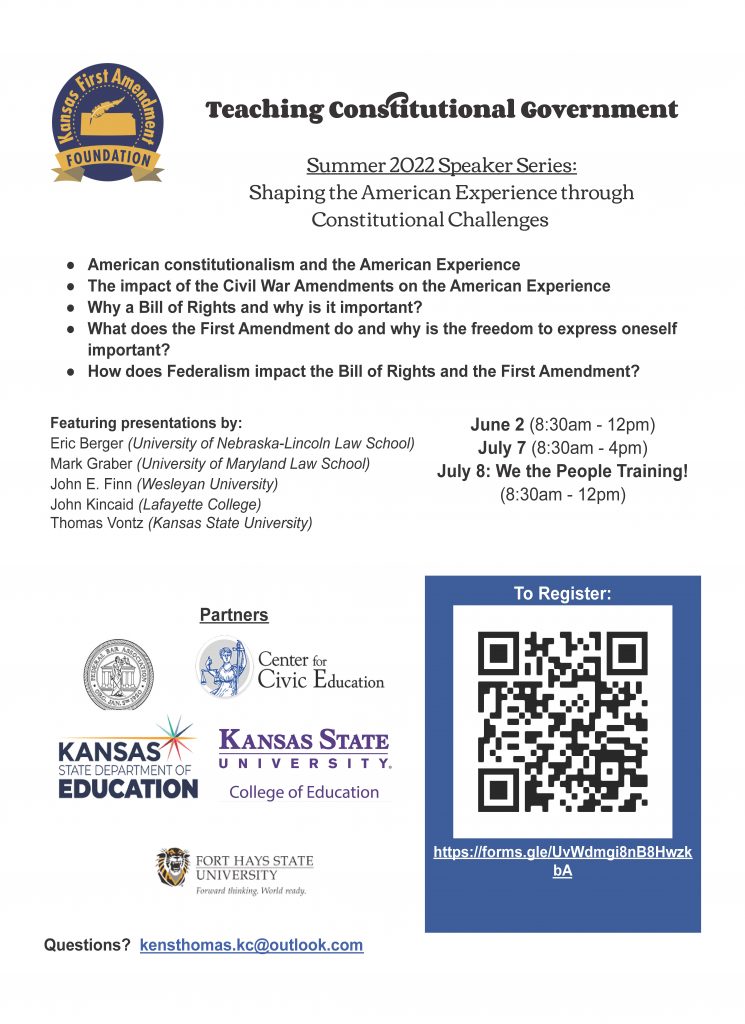May 2022 Newsletter
Another One Bites the Dust! Closing Out the 2021-2022 School Year
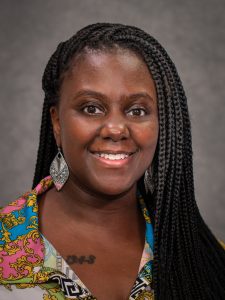 I cannot believe it! Here we are closing out another school year. Each and everyone of you May’ed it! Nebraska social studies educators, you all are a special bunch who keep rising to the occasion. In the past year you all have done some pretty amazing things! You are embracing inquiry, selecting high-quality instructional materials for students, figuring out how to effectively teach multicultural education, and centering civics regardless of the social studies discipline. I have had the pleasure of sharing in this work with educators from across the state of
I cannot believe it! Here we are closing out another school year. Each and everyone of you May’ed it! Nebraska social studies educators, you all are a special bunch who keep rising to the occasion. In the past year you all have done some pretty amazing things! You are embracing inquiry, selecting high-quality instructional materials for students, figuring out how to effectively teach multicultural education, and centering civics regardless of the social studies discipline. I have had the pleasure of sharing in this work with educators from across the state of Nebraska, including Oshkosh, Ainsworth, Shickley, Wakefield, and all of the places in between. You all have reached out to me with your questions, concerns, and hopes for the future. This year has not been without its own challenges and I am just so stinkin’ proud of how social studies educators have handled them all! In the coming school years, I look forward to all that you all will continue to do for Nebraska students.
Nebraska, including Oshkosh, Ainsworth, Shickley, Wakefield, and all of the places in between. You all have reached out to me with your questions, concerns, and hopes for the future. This year has not been without its own challenges and I am just so stinkin’ proud of how social studies educators have handled them all! In the coming school years, I look forward to all that you all will continue to do for Nebraska students.
Just as last year, the newsletter will pause during the summer months. This should be a time of rest, relaxation, and time spent with loved ones. You do not need me bombarding you with more information. Because the monthly newsletter will pause in June and July, I have jam packed this month’s outreach with as much as I could! I hope you find the resources helpful. Enjoy your summer break and we will chat again!
All my best, wishing you and yours the best summer vacation ever!
-Ebony
New Social Studies Vision and Mission Statements
Did you know that it has been almost thirty years since the vision and mission statements for social studies in Nebraska have been updated? According to opengrowth.com, “A vision and mission is important for strategic direction. It helps everyone within an organization know the purpose of its existence and core values on which it is governed. It is an integral part that helps to set priorities and ensure that everyone is working towards common goals and objectives, thus providing a road-map to the future.”
The new vision and mission for Nebraska have been developed through a collaborative effort with educators and ESU personnel throughout the state. So, without any further delay, I now present to you our NEW Nebraska Social Studies Vision and Mission Statements!
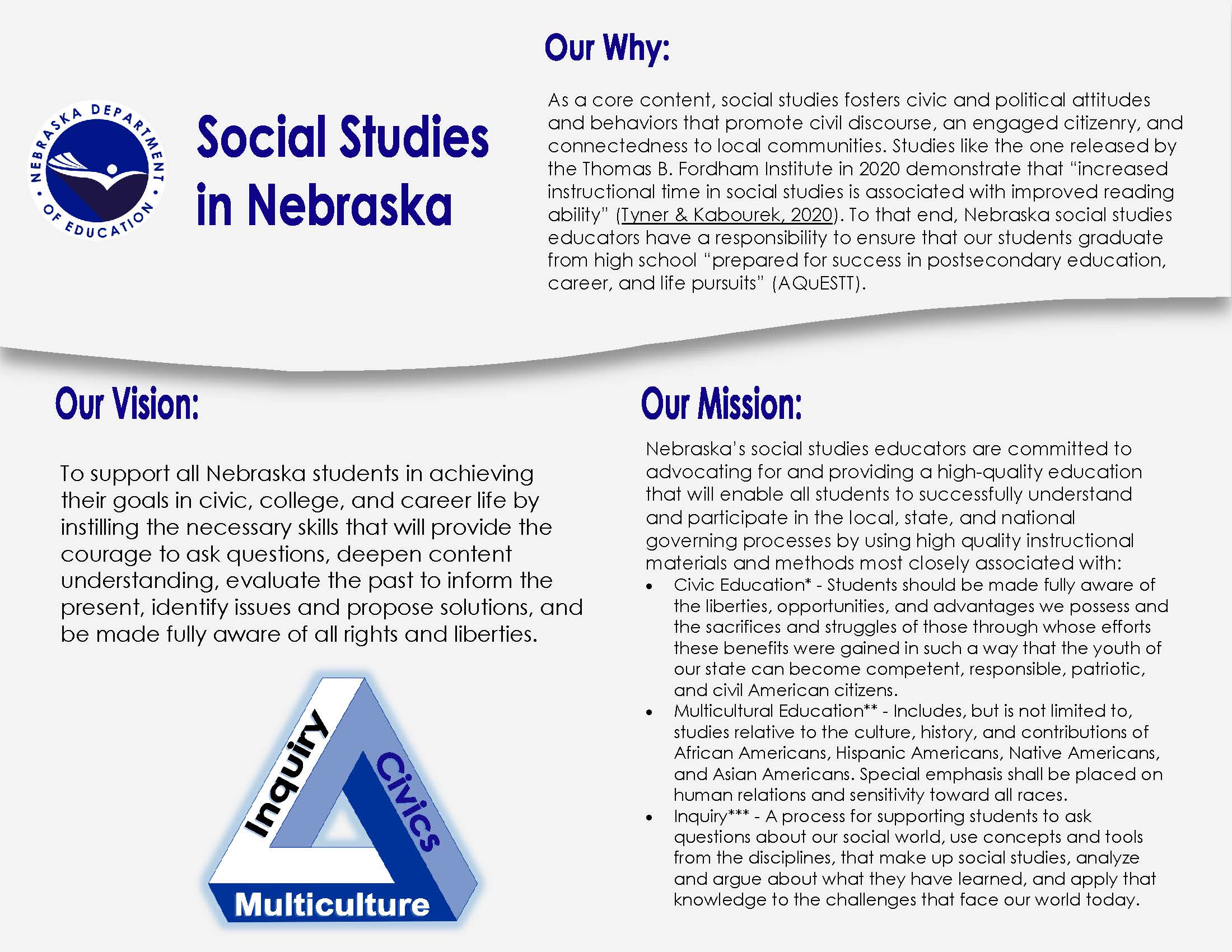
Nebraska Social Studies Podcast!
Guess what?! Nebraska social studies has its own podcast! The name of the podcast is “Social Responsibilities” and features two Nebraska social studies educators. “Social Responsibilities” highlights the work around inquiry-based learning as a lever for using high-quality instructional materials.
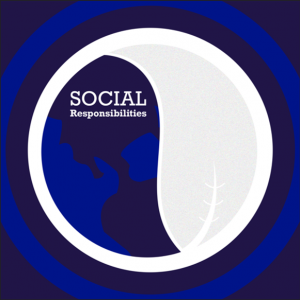 There are a couple of things that many of us have come to expect from social studies education. The first is promoting the rights, ideals, liberties, and principles that our country has come to value. The second is the high importance that we place on text and other instructional materials. This podcast seeks to serve as an opportunity for social studies educators to rediscover the importance of high-quality instructional materials (HQIM’s). We seek to help teachers envision a world in which they can properly identify and choose HQIMs rather than always making their own materials from scratch. We offer a look into how to curate and teach documents that embrace multicultural education and multiple perspectives. We hope that through this process, educators can start believing that HQIMs can be a lever for equity, and as inquiry gains popularity as an instructional method (as it should), our goal is to reiterate the framing and rationale for using high-quality instructional materials to deepen both students’ use of inquiry and use those skills closely associated with social studies like contextualization, corroboration, and understanding multiple perspectives.
There are a couple of things that many of us have come to expect from social studies education. The first is promoting the rights, ideals, liberties, and principles that our country has come to value. The second is the high importance that we place on text and other instructional materials. This podcast seeks to serve as an opportunity for social studies educators to rediscover the importance of high-quality instructional materials (HQIM’s). We seek to help teachers envision a world in which they can properly identify and choose HQIMs rather than always making their own materials from scratch. We offer a look into how to curate and teach documents that embrace multicultural education and multiple perspectives. We hope that through this process, educators can start believing that HQIMs can be a lever for equity, and as inquiry gains popularity as an instructional method (as it should), our goal is to reiterate the framing and rationale for using high-quality instructional materials to deepen both students’ use of inquiry and use those skills closely associated with social studies like contextualization, corroboration, and understanding multiple perspectives.
Yes, the podcast is about instructional methods and materials, but we aimed to create an engaging experience with a couple of laughs and some lighthearted conversation throughout. Stream from all of the major platforms and please download, listen and share! And if you have any questions, send us an email or visit the Social Responsibilities Podcast webpage!
2022 Summer Professional Development Opportunities in Social Studies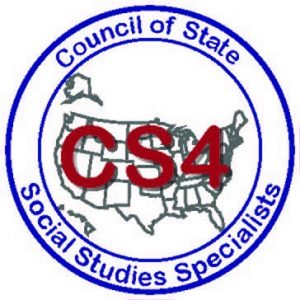
This document was compiled by the Council of State Social Studies Supervisors as a way to communicate the wealth of professional development opportunities available to social studies educators. A special thanks to all of the organizations who helped contribute to this work and to the many organizations who are offering high quality social studies professional development for social studies teachers across the country. Many of the opportunities below are offered free or low cost, but some opportunities do have a cost. When opportunities are highlighted in yellow, it means there are not yet 2022 updates for that particular program. The document will be updated through the spring of 2022. Please email Stefanie Wager at stefanie.rosenbergwager@gmail.com with any questions, comments, or to add programs to this list.
Nebraska Social Studies Inquiry Training
UNL Global Challenges Summer Camp: Environmental Innovation and Leadership (Student Opportunity)
Catherine G. Jurgemeyer Memorial Scholarship (Student Opportunity)
Since 1958, the American Lawyers Alliance has been recognizing excellence in Law-Related Education by presenting our annual Law-Related Education Teacher of the Year Awards to the nation’s top civics teachers, our Judicial Civic Education Award to a dedicated jurist for his or her work in promoting Law-Related Education, and individual awards to those whose excellent work has fostered the furtherance of Law-Related Education.
 Now we are most excited to announce our newest award:
Now we are most excited to announce our newest award:
The $10,000 Catherine G. Jurgemeyer Memorial Scholarship
The purpose of this scholarship is to reward one deserving high school senior whose body of work, both inside and outside the classroom, has demonstrated a special dedication to Law-Related Education with academic excellence.
The requirements of this reward are quite rigorous, and we are looking for that outstanding student who meets or exceeds the criteria and deserves to be recognized. We would like your help in getting the word out about this new scholarship, so please forward this information to your students, peers, colleagues, college counselors, or whomever you feel may know of such a deserving student.
The application deadline is May 31, 2022, the winner will be announced no later than July 1, 2022, and the presentation will be made at our ALA Annual Meeting in Chicago in early August, so time is of the essence!
Please contact me if you have any questions. Thank you for all you do for law-related education. I look forward to seeing many excellent applications!
Most sincerely,
Noel Roberts
Capitol Forum on America’s Future

Join the statewide program that engages students in key global issues and current events.
Capitol Forum on America’s Future
Presented by Humanities Nebraska and the Office of Nebraska Secretary of State Bob Evnen.
Using the Choices Curriculum from Brown University, made available to Nebraska teachers at no cost by Humanities Nebraska, you can empower your students to become engaged, informed citizens.
As your students learn about international trade, terrorism, immigration, nuclear proliferation, and climate change, this program can instill in them the power to hold thoughtful conversations and make education decisions.
Benefits to students:
- Develop critical thinking skills
- Understand foreign policy and current events
- Cultivate deliberative techniques and skills in civil discourse
- Discuss important issues with peers from throughout the state as well as with Nebraska’s elected officials
Benefits to Teachers/Schools:
- High-quality Choices curriculum units, including two of the teacher’s choice, for semester or year-long study
- Professional development through workshops with an expert in one of the five Capitol Forum themes
- Outstanding professional learning community with other social studies teachers from across Nebraska
- Travel costs (including lodging, if applicable) for teachers and a delegation of up to five students
- Substitute teacher pay reimbursement to school
Higher-Level Geography at the Secondary Level Summer Professional Development
Join us this summer at the Department of Geography and Geology at the University of Nebraska Omaha for a professional development
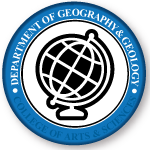 opportunity open to present and perspective secondary social studies teachers. Participants will meet with experienced staff and colleagues from around Nebraska to learn about how to implement Dual-Enrollment Geography or AP® Human Geography into their own schools. This opportunity will take place either Tuesday July 12th, or Tuesday July 19th at the UNO campus. Participants will receive lesson ideas, information on how to be certified for AP® and Dual Enrollment, and a $100 stipend for participating.
opportunity open to present and perspective secondary social studies teachers. Participants will meet with experienced staff and colleagues from around Nebraska to learn about how to implement Dual-Enrollment Geography or AP® Human Geography into their own schools. This opportunity will take place either Tuesday July 12th, or Tuesday July 19th at the UNO campus. Participants will receive lesson ideas, information on how to be certified for AP® and Dual Enrollment, and a $100 stipend for participating.
Please fill out the form to participate. Spots are limited.
Please contact Kyle Tredinnick (ktredinnick@unomaha.edu) with any questions!
Econ Book Club
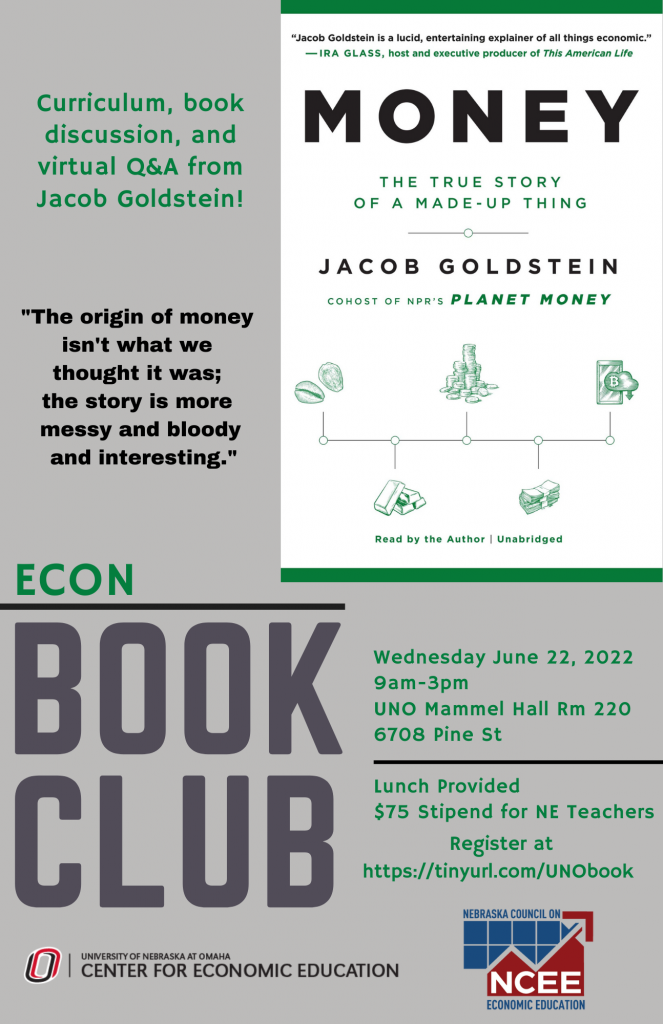
Asian American, Native Hawaiian, and Pacific Islander Heritage Month Teacher Resources
 May is Asian American, Native Hawaiian, and Pacific Islander Heritage Month and we are celebrating the histories of Americans from the Pacific Islands and the continent of Asia! “As of 2019, there were about 22.9 million people of Asian or Pacific Islander descent in the United States. According to the Pew Research Center, AAPI people are a diverse and growing population that make up about 7 percent of the total U.S. population. The effort to officially recognize Asian American and Pacific Islander contributions to the United States began in the late 1970s, and took over 10 years to make it a permanent month-long celebration.”
May is Asian American, Native Hawaiian, and Pacific Islander Heritage Month and we are celebrating the histories of Americans from the Pacific Islands and the continent of Asia! “As of 2019, there were about 22.9 million people of Asian or Pacific Islander descent in the United States. According to the Pew Research Center, AAPI people are a diverse and growing population that make up about 7 percent of the total U.S. population. The effort to officially recognize Asian American and Pacific Islander contributions to the United States began in the late 1970s, and took over 10 years to make it a permanent month-long celebration.”
Below are resources for educators wanting to incorporate AANPI instructional materials in their classrooms.
Teaching Resources:
- Asian American and Pacific Islander Heritage Month (Library of Congress)
- Celebrate Asian American Pacific Islander Heritage Month (PBS)
- Asian American and Native Hawaiian, Pacific Islander Heritage Month (NPS)
- >31 Ways to Celebrate AAPI Heritage Month in 2022 (Asia Society)
- Asian Pacific American History (Smithsonian Learning Lab)
- Asian Pacific American Booklist (Colorin’ Colorado)
- AANHPI Resources (Federal Asian Pacific American Council)
- Resources for Asian American and Pacific Islander Heritage Month (Pear Deck)
Journals, Publications, and Articles:
- Social Education: Teaching and Learning about Asian American History (March/April 2022). Social Studies and the Young Learner: Asian American Narratives in U.S. History and Contemporary Society (January/February 2022).
- Social Studies and the Young Learner: The Voices of Children: Re-imagining the Internment of Japanese Americans through Poetry.
Exhibits:
- Smithsonian Asian Pacific American Center: Smithsonian APA Center Homepage.
- Smithsonian Institute: Righting a Wrong: Japanese Americans and World War II.
Videos:
- Library of Congress: Asian Pacific American Heritage Month: Featured Videos; Selected Audio and Video.
- National Museum of American History: Stories of Racism, Resilience, and Resistance in Asian American Communities.
- Smithsonian Institute: Featured Videos for Asian Pacific American Heritage Month.
Podcasts
- Visions of Education: Episode 160: An AsianCrit Perspective on U.S. History with Sohyun An.
- Visions of Education: Episode 76: Teaching Asian-American Histories with Noreen Naseem Rodriguez.
NCSS Introduces the Seal of Civic Readiness Toolkit and Celebrates #Civics4CommUNITY Week
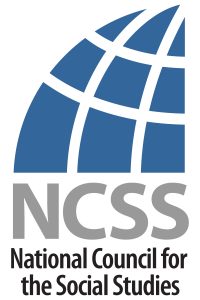 To help ensure the longevity of our democracy, National Council for the Social Studies (NCSS) encourages the creation of a civics diploma seals program in your state, district, or school. We have created a modular Seal of Civic Readiness Toolkit with timelines, frequently asked questions, creation steps, and advocacy tips. The toolkit will help your school create, implement, and adopt the seal for usage.
To help ensure the longevity of our democracy, National Council for the Social Studies (NCSS) encourages the creation of a civics diploma seals program in your state, district, or school. We have created a modular Seal of Civic Readiness Toolkit with timelines, frequently asked questions, creation steps, and advocacy tips. The toolkit will help your school create, implement, and adopt the seal for usage.
Why Should We Teach Civics? Why Should I Adopt a Civics Diploma Seals Program?
Democracy by nature requires an informed and engaged electorate. Research tells us that it is critical that students participate in civic learning that includes:
- the 21st-century skills of collaboration, cooperation, and consensus-building;
- an understanding of the rights and responsibilities of citizenship; and
- knowledge on the roots of our democracy.
Civics diploma seals are tangible symbols of the value of comprehensive and research-based civic education practices in schools. A diploma seal is an endorsement that indicates exemplary performance in a specific area of study, and a civics diploma seal can signify a student’s competency in civic knowledge, responsibility, values, and engagement. Seals send a signal to colleges and employers that a student has excelled in an area of study.
Local education agencies can also take great pride in the number of diploma seals that are awarded to students, and diploma seals can serve as an accountability measure for school effectiveness, and a way to encourage parents and the public to support civic education.
EVERFI’s Financial Wellness Suite
Maverick Investment Camp (Student Opportunity)
The OER Conference for Social Studies
Mark your calendar, the third annual OER Conference for the Social Studies (OC for SS) arrives August 3–4, 2022! Since 2020, the OC for SS has become one of the biggest professional development events for social studies teachers in America, bringing thousands of teachers from across the country together to learn and grow. 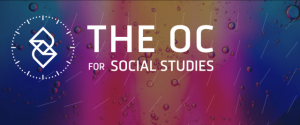
A free, virtual experience for K–12 educators, OC for SS is the best place to connect with leaders in the field and equip yourself for the challenges of today’s classrooms.
Past keynotes have included author John Green; social justice activist Bryan Stevenson; and journalist and historian Jill Lepore. We’ll be announcing this year’s lineup of influential speakers over the next few months, plus details about clock hours, our pre-conference book club, and our slate of Track Talk videos.
The OER Conference will also feature Track Talks. Track Talks are short TED-style videos recorded by leading educators on the topics you need to know about as an educator. We will be gradually releasing these videos in the weeks leading up to the conference to give you time to check them all out, and discuss them in the conference discussion forum ahead of the event.
We’d love to go on, but there’s plenty more work on our end to get this year’s OC for SS ready for you! We can’t wait to see you in August—reserve your spot now!
Onsite Professional Development in Jackson Hole, WY: Using Project Citizen to Promote Civic Engagement
 For any Nebraska educator interested, here are a few opportunities from K-State’s Center for Social Studies Education in collaboration with Wyoming Project Citizen, the Center for Civic Education, and the Center for the Study of Federalism have designed specifically for social studies teachers.
For any Nebraska educator interested, here are a few opportunities from K-State’s Center for Social Studies Education in collaboration with Wyoming Project Citizen, the Center for Civic Education, and the Center for the Study of Federalism have designed specifically for social studies teachers.
What: Participate in Project Citizen Professional Development and Research Project. Teachers will be selected randomly for both the training and control groups.
Who: Middle and high school teachers from Colorado, Kansas, Montana, Nebraska, New Mexico, North Dakota, Oklahoma, South Dakota, Texas, and Wyoming.
Where: Teton Science Center outside of Jackson Hole, WY. Double-room occupancy.
When: July 24 – 30, 2022 from 9:00 am – 3:00 pm daily
Why: All expenses paid workshop in Jackson Hole, WY; First-Rate Professional Development; Free Classroom Resources; $750 Stipend OR THREE hours of graduate political science or education credit ($1,500.00 value); active, hands on, civic learning.
How: Download the application! Applications due June 15, 2022. Questions? Contact Dr. Vontz tvontz@ksu.edu
Teaching Constitutional Government
Nebraska Stories of Humanity
New Nebraska law requires that the Holocaust and genocide education be adopted into the social studies state standards (state statute 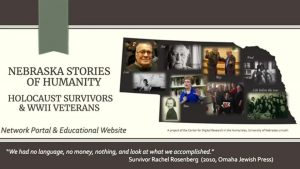 79.760.01). Here is a wonderful resource that secondary educators can use to help tell the story of Holocaust survivors.
79.760.01). Here is a wonderful resource that secondary educators can use to help tell the story of Holocaust survivors.
The Nebraska Stories of Humanity: Holocaust Survivors & WWII Veterans, Network Portal & Educational Website aims to centralize access to the history of Nebraska Holocaust survivors and WWII liberators of Nazi camps in a collection of searchable stories in aggregate. The site includes testimony, geographical and primary historical resources, documentation, and photos collected or harvested from local and disparate sources. Various tools enhance these stories through technologies such as digital story maps, access to testimonies, and network analysis of these individuals who were connected to and involved in their Nebraska communities. The project engages individual contributors, local stakeholder organizations, and national and international repositories.



